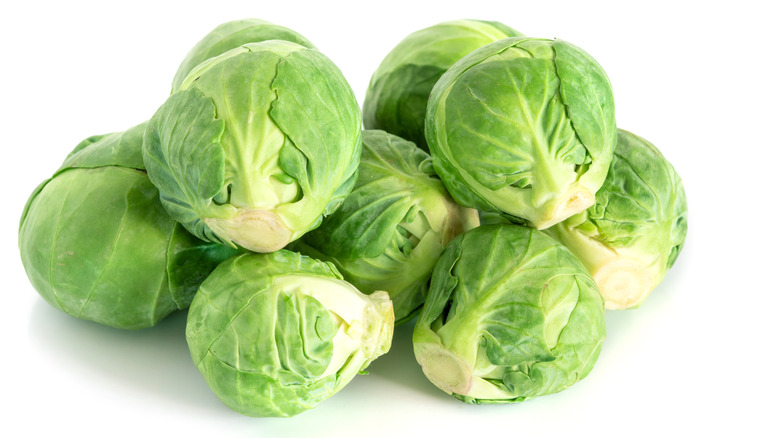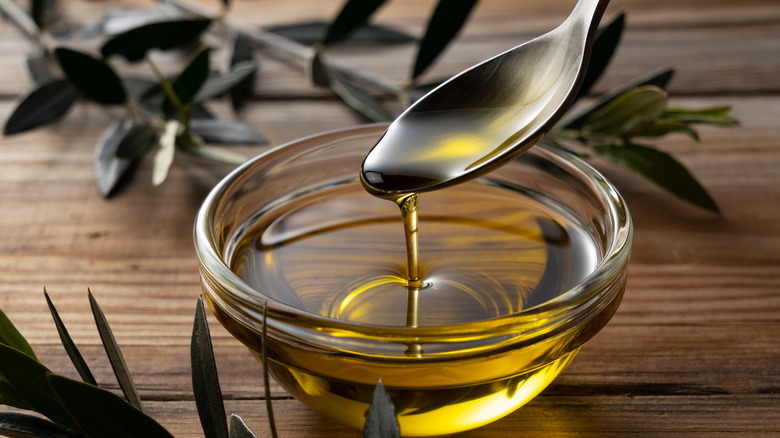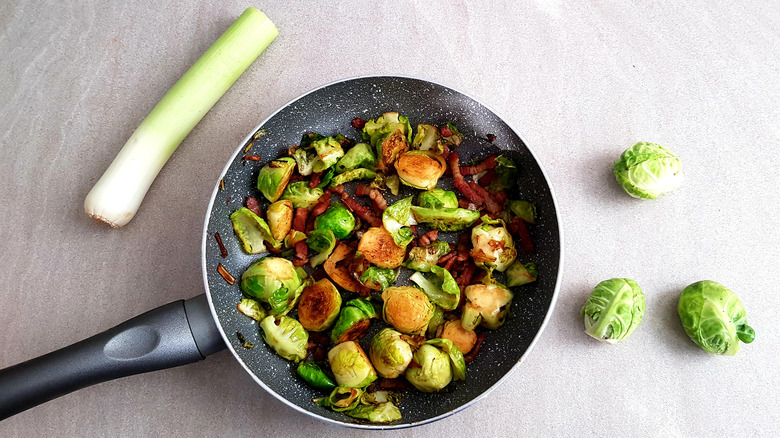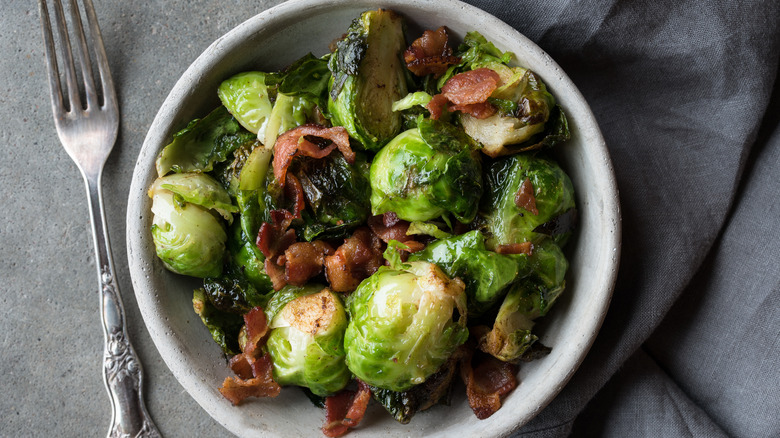The Oil Mistake You're Probably Making When Roasting Brussels Sprouts
Brussels sprouts used to get a bad rep. But over the last few years, they seem to have skyrocketed in popularity, becoming one of the trendier vegetables to pop up in restaurants across the U.S. According to Datassentials findings reported in 2022 (via Nation's Restaurant News), these little round crucifers have reached a point of proliferation, apparently seeing a 47% increase on menus over four years. The vice president of production at California-based Ocean Mist Farms, Paul Scheid, remarked on the growing demand in 2021, telling Capital Press that it happened because consumers found more appealing ways to cook Brussels sprouts than simply boiling them.
The unfortunate thing about boiling is that it doesn't reduce the bitterness of Brussels sprouts (via Livestrong) but apparently does highlight the smell. Luckily, there are plenty of ways to prepare Brussels sprouts — it has become increasingly common for restaurants to serve them crispy and fried, for instance. Or you can have them in a salad. But as noted by Scheid, one of the most popular options is to roast them.
Tossed in oil, sprinkled with the seasonings and salt of your choosing, and baked in the oven, roasted Brussels sprouts can be a recipe for satisfying crunchiness and flavor if they're done properly. According to restaurateur Natalia Levey, roasting reduces the vegetable's bitterness by bringing out sweetness through caramelization. However, many people make a major mistake when it comes to the oil they're using. Here's how to roast Brussels sprouts the right way.
The amount of oil makes a difference
One of the most common faux pas when it comes to roasting Brussels sprouts is not using enough oil. According to The Kitchn, a good rule of thumb is about 2 tablespoons of oil per pound of raw Brussels sprouts. A good coating leads to caramelization and charring, the site explains. Without the proper amount of oil, you might just get a mouthful of soft green mush.
Recipe developer and holistic nutritionist Cassie Johnston, who founded the blog Wholefully, says that the best way to achieve good caramelization is to cut the Brussels sprouts in half to increase surface area. To make sure each sprout is covered, she recommends tossing them in a bowl with the proper amount of oil until well-coated. While The Kitchn says vegetable oil would do the trick, both it and Wholefully prefer olive oil. Note that it's possible to go too far the other way and use too much oil.
Don't go too far in the other direction
Celebrity chef Pamela Salzman warns that overdoing it with the oil prevents vegetables from crisping (via NBC News). It's sort of like when you put a steak in the pan and try to add more oil than you need. That can prevent the meat from getting a proper sear, according to Ranch 45 co-founder Pam Schwartz (per Eat This, Not That!). Then you're left with soggy, grease-soaked food and none of the tasty crust. That's not what you want for roasted Brussels sprouts. There's a sweet spot for the amount of oil, and it's important in nailing the right texture of your veggies.
Plus, scientists have demonstrated that highly concentrated fat can come off as rancid or bitter to taste buds, according to research from Purdue University. Chef John Eisensmith's site Season to Taste notes that extra olive oil, for instance, may actually increase bitterness in food. So one could imagine that coating an already somewhat-bitter veg like Brussels or broccoli in too much fat might fail to counteract the less-than-pleasant flavor compounds. To cut through the fat, you can try adding an acid like lemon juice, and of course, a sprinkling of salt.
Other ways to make your sprouts shine
Brussels sprouts species are actually bred to be less bitter than the ones you probably remember from your childhood (via NPR). Thanks to the tireless work of a Dutch scientist, growers were able to identify the chemical compounds that made the sprouts so bitter, and then selectively grew varieties with low levels of those compounds. That has made them easier to pair in cooking.
Bacon is another popular choice to pair with Brussels sprouts. It will fry up nicely, adding salt, smokiness, and crunch to the dish. Or you can consider combining them with balsamic vinegar and cheese, as with this recipe for Parmesan Brussels sprouts. Whenever you're working with a veggie with super distinct flavors like sprouts, you want to strive for balance in the flavor. When in doubt about Brussels sprouts, you could always follow Samin Nosrat's famous, cooking method – mix salt, fat, acid, and heat, and hopefully, everything will be fine.



